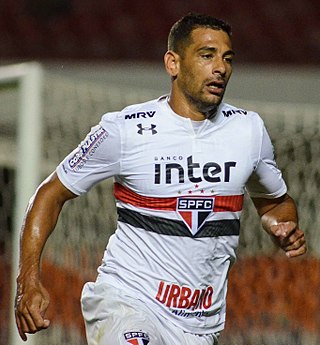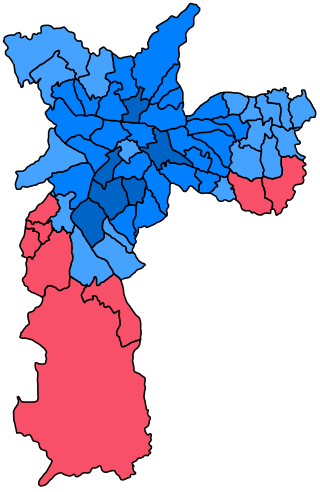
Recife is the fourth-largest urban area in Brazil with 4,054,866 inhabitants, the largest urban area of the North/Northeast Regions, and the capital and largest city of the state of Pernambuco in the northeast corner of South America. The population of the city proper was 1,653,461 in 2020. Recife was founded in 1537, during the early Portuguese colonization of Brazil, as the main harbor of the Captaincy of Pernambuco, known for its large scale production of sugar cane. It was the former capital Mauritsstad of the 17th century colony of New Holland of Dutch Brazil, established by the Dutch West India Company. The city is located at the confluence of the Beberibe and Capibaribe rivers before they flow into the South Atlantic Ocean. It is a major port on the Atlantic. Its name is an allusion to the stone reefs that are present by the city's shores. The many rivers, small islands and over 50 bridges found in Recife city centre characterise its geography and led to the city being called the "Brazilian Venice". As of 2010, it is the capital city with the highest HDI in Northeast Brazil and second highest HDI in the entire North and Northeast Brazil.

The Communist Party of Brazil is a political party in Brazil. The PCdoB officially adheres to Marxist–Leninist theory. It has national reach and deep penetration in the trade union and student movements, but little representation in elected positions.

The Brazilian Communist Party, originally the Communist Party of Brazil, is a communist party in Brazil, founded on 25 March 1922. Arguably the oldest active political party in Brazil, it played an important role in the country's 20th-century history despite the relatively small number of members. A factional dispute led to the formation of PCdoB in the 1960s, though both communist parties were united in opposition to the Brazilian military government that ruled from 1964 to 1985. But with the fall of the Soviet Union and the collapse of communism circa 1990, the party lost power and international support. An internal coup in 1992 divided the party and formed a new party, called Popular Socialist Party, using the former identification number of the PCB, 23. That party has since moved towards the centre and now goes by the name Cidadania.
The Social Christian Party was a Christian-conservative political party in Brazil.

Diego de Souza Andrade is a Brazilian professional footballer who plays as a forward for Sport Recife.

The Liberal Party is a centre-right to right-wing political party in Brazil. From its foundation in 2006 until 2019, it was called the Party of the Republic.

The Brazilian Labour Renewal Party is a conservative Brazilian political party. It was founded in 1994 and its electoral number is 28. According to the party's official website, the PRTB's main ideology is participatory economics: "to establish an economic system based on participatory decision making as the primary economic mechanism for allocation in society".

Dorival Silvestre Júnior is a Brazilian professional football coach and former player who played as a defensive midfielder. He is the current head coach of the Brazil national team.

The Brazilian Labour Party was a political party in Brazil registered in 1981 by Ivete Vargas, niece of President Getúlio Vargas. It claimed the legacy of the historical PTB, although many historians reject this because the early version of PTB was a center-left party with wide support in the working class. It was the seventh largest political party in Brazil with more than a million affiliated as of 2022.

Laerte Coutinho, known mainly as simply Laerte, is a Brazilian cartoonist and screenwriter, known for creating comic strips such as Piratas do Tietê.
The Brazilian Woman's Party is a right-wing political party in Brazil which uses the number 35. Known for its non-feminist and anti-abortion stance, the party is not represented in the National Congress.

The 2020 São Paulo municipal election took place in the city of São Paulo, Brazil, with the first round taking place on 15 November 2020 and the second round taking place on 29 November 2020. Voters voted to elect the Mayor, the Vice Mayor and 55 city councillors for the administration of the city. The result was a 2nd round victory for incumbent Mayor Bruno Covas of the Brazilian Social Democratic Party (PSDB), winning 3,169,121 votes and a share of 59,38% of the popular vote, defeating political activist Guilherme Boulos of the Socialism and Liberty Party (PSOL), who took 2,168,109 votes and a share of 40.62% of the popular vote.

Popular Unity, also known as Popular Unity for Socialism, is a Brazilian political party founded on 16 June 2016, which had its right to launch candidacies recognized by the Superior Electoral Court (TSE) on 10 December 2019. As a socialist party, it is connected to homeless workers' movements and defends the nationalization of the banking system, social control of all monopolies, capitalist consortia, and the means of production at-large, as well as rural land reform and collectivization.

The 2022 São Paulo state election took place in the state of São Paulo, Brazil on 2 October 2022 and 30 October 2022. Voters elected a Governor, Vice Governor, one Senator, 70 representatives for the Chamber of Deputies, and 94 Legislative Assembly members. The incumbent Governor, Rodrigo Garcia, of the Brazilian Social Democracy Party (PSDB), was eligible for a second term and ran for reelection.

The 2021 Brazilian protests were popular demonstrations that took place in different regions of Brazil in the context of the COVID-19 pandemic. Protests both supporting and opposing the government happened.

The 2021 PSDB presidential primary was held on 21 and 27 November 2021 to elect the Brazilian Social Democracy Party presidential nominee.

The Brazil Union is a liberal-conservative political party in Brazil. The party was founded on 6 October 2021 through the merger of the Democrats (DEM) and the Social Liberal Party (PSL). The merger resulted in the biggest party in Brazil, and was approved by Brazil's Superior Electoral Court on 8 February 2022.

João Vitor Romania Balbino, known professionally as Jão, is a Brazilian singer-songwriter.
The Democratic Renewal Party is a political party in Brazil, announced on 26 October 2022 as a fusion of Patriota and the Brazilian Labour Party (PTB). Both parties didn't reach the electoral threshold in the 2022 general election. Consequently, they would not have access to resources of the partisan budget nor the right of political propaganda in radio and television.
General elections will be held in Brazil on 4 October 2026 to elect the president, vice president, members of the National Congress, the governors, vice governors, and legislative assemblies of all federative units, and the district council of Fernando de Noronha. If no candidate for president—or for governor in some states—received more than half of the valid votes in the first round, a runoff election for these offices will be held on 31 October.


















